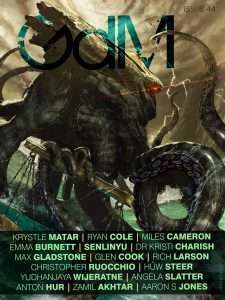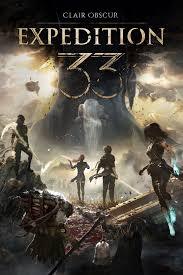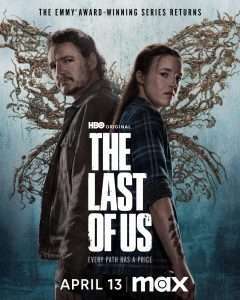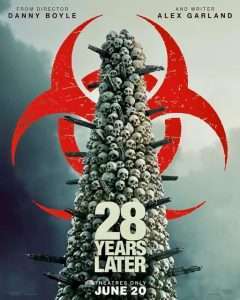The Power of Fantasy and Sci-fi when Dealing with Grief
Why are we drawn to dark stories? Let’s take that one step further. Why are we drawn to stories that are fantastical and otherworldly? This is something that I have written about previously as grimdark shows that even the slimmest ray of hope can illuminate the darkest corners. There isn’t much darker than grief. Stories in all their forms allow us to process ideas and events that we may not have dealt with before. There’s no handbook for dealing with grief that works for everyone—it can be a personal experience. Stories can help us. After playing Clair Obscur: Expedition 33 recently, I thought about how stories have helped me think about grief and taught me about the different ways death can affect people. Just in the past few years: God of War, Final Fantasy XVI, Arcane, The Last of Us, Black Panther: Wakanda Forever have all shown different ways in which characters and their relationships are shaped by grief. They are powerful stories that give the audience something to think about, and sometimes even the tools to help in their own lives as they face grief.
Grief in Gaming One of the earliest memories on my PlayStation is playing Final Fantasy VII. I loved the story. An epic tale of fighting against an all-powerful company and a legendary warrior that involved the death of a beloved character part way through.
One of the earliest memories on my PlayStation is playing Final Fantasy VII. I loved the story. An epic tale of fighting against an all-powerful company and a legendary warrior that involved the death of a beloved character part way through.
I remember feeling distraught at the loss but determined to complete the game and fight on, something that I could see happen in the group of characters who pulled together with the singular aim of not losing anyone else. The sacrifice wakes you up to the possibility of failure and loss and adds another dimension to the story. Grief is something that Final Fantasy has never shied away from. Having a large cast of characters, they have always proved that the stakes were high with the death of beloved characters and it is something that the developers of Clair Obscur: Expedition 33 certainly learned from.
Death cannot be meaningless; it must serve a purpose for it to have an impact. Final Fantasy XVI may be a divisive entry in the series (I loved it—like Final Fantasy meets Game of Thrones) but the main arc for Clive was a masterclass in dealing with grief and the impact it can have. Losing his family and home early in the story, he puts up barriers and loses some of the warmth he would have had if things had been different.
He knows the dangers of trust, love, and relationships. Perhaps, he realizes, it is better to make your heart a stone so that it cannot break. Throughout the story, Clive meets others who bring out the best in him and make him realise that a life alone is nowhere near as fulfilling as one lived with loved ones near. This makes him fight for others and eventually make a devastating but beautiful decision at the end of the game. Playing this as an adult allowed me to appreciate Clive’s arc. I’d seen people make similar decisions by closing themselves off from the world. The game was a reminder that the power of community and love is so important for us all and that there is a light that can be found even in the darkest of places.
 God of War is a gaming series that has changed a lot over time. The original, released in 2005 on the PlayStation 2 was a hack and slash game with an interesting story—Greek warrior Kratos was on a mission to kill Ares to avenge the death of his family. It shows how destructive grief can be when channelled into hate and revenge as Kratos spends much of the game slashing through anyone in his way in an attempt to hack away at his memories of the deceased.
God of War is a gaming series that has changed a lot over time. The original, released in 2005 on the PlayStation 2 was a hack and slash game with an interesting story—Greek warrior Kratos was on a mission to kill Ares to avenge the death of his family. It shows how destructive grief can be when channelled into hate and revenge as Kratos spends much of the game slashing through anyone in his way in an attempt to hack away at his memories of the deceased.
The series took a different route when relaunching on the PlayStation 4. Inspired now by Norse Mythology, Kratos is older and wiser. He has a son with him and the story starts with them mourning the death of the boy’s mother. It’s the catalyst for another series and shows Kratos as being careful and thoughtful in his grief. He is not the rash, hate-filled warrior of old and he has a boy to care for. He does not want either of them to fall down the path he did back in Greece where he saw revenge as his only outlet for his grief and was consumed in a world of violence. There is a silence in Kratos’ grief this time as it simmers under the surface. He is patient and quiet as he struggles to effectively mourn the woman he loves and this creates a barrier between him and his son as he does not know how to help the boy whilst dealing with his own grief. There is a slow unravelling of tenderness between the two as Kratos realises that he must show emotion to support his son or the tension between them will grow. In trying to protect his son from the damage of emotions, he ends up pushing him away before realising that he must open up and only then can they share their feelings and move forward together. Their eventual connection is a hard-earned thing and beautiful when it arrives as they grow to understand one another.
Finally in gaming, Clair Obscur: Expedition 33. Grief in this stunningly developed world is everywhere. This is a world painted by grief. Characters respond to it in different ways and you see this in the first moments of the game There is joy, love, passion, remorse, sadness, anger, frustration, all sitting there in those first moments and clear for all to see: lovers embracing for the final time, music and dancing, drinking and games, even the odd fight or two. People come together in the first scene knowing that they are there to witness the final moments in the lives of those who have been chosen to die that year. It is both a celebration of life and a chance for some to come together and share their ideas on how to fight against this seemingly inevitable fate as a god-like figure called the Paintress pulls characters who have reached the age of 33 from the world. There are those who accept death and those who fight against it. And in the end, the player gets to choose how
they deal with grief. It’s impactful and its story is one of the best in gaming.
Grief in TV and Film The Last of Us is full of death and brutality. The game is one of my favourites due to the cinematic direction and storytelling and I was impressed with the changes made for the TV series by HBO. The series begins much like the game, main character Joel is shaped by the death of his daughter during the outbreak of an apocalyptic event. It changes him, hardens his heart.
The Last of Us is full of death and brutality. The game is one of my favourites due to the cinematic direction and storytelling and I was impressed with the changes made for the TV series by HBO. The series begins much like the game, main character Joel is shaped by the death of his daughter during the outbreak of an apocalyptic event. It changes him, hardens his heart.
What I enjoyed most about the series is how it showed people doing not just what they can to survive but also to avoid feeling grief again. To protect Ellie, someone Joel grows to feel is his daughter, he goes to extraordinary lengths and does some dubious things.
The best episode of the first season explored the relationship between Bill and Frank. It is a beautiful tale of their relationship but it also shows that their love is so strong they cannot allow one to die and the other to survive. Neither is prepared to grieve the other as a life alone is unthinkable after all they had been through together. The second and third season, based on the second game, follow two paths: one familiar character and one newly introduced. Both show the dangers of using grief to fuel hate and revenge to the detriment of themselves and the relationships with those they love.
My favourite character in 28 Years Later was played by the incredible Ralph Fiennes. Dr. Kelson is strange and interesting. His Bone Temple is a memory of the dead, a reminder of what has been lost and this is something he tries to pass on to those who encounter his home. People die, yes, but we must live. He is the best part of what is a masterpiece of storytelling about grief on a large scale while using intimate moments of reflection.
One of the best TV series, Arcane, blew the Grimdark team away with its stunning visuals and multi-layered storytelling. It delivered a devastating portrayal of grief as sisters Vi and Jinx struggle to come to terms with the loss of their parents and try to toughen themselves up in the hopes of never feeling that soft again. The sisters drift apart, each dealing with loss in their own way whilst others use this vulnerable stage to drive forward their own agendas. It is only when they let their guards down that they can start to build meaningful relationships once more.
 There are many moments in Game of Thrones that show the effect of grief: Arya’s path following the beheading of her father Ned Stark, Robert Baratheon waging a war on the king following the death of his love (more pride than grief perhaps…), but it is the Viper and the Mountain fight that is seared into my mind. Prince Oberyn does the impossible and takes down the unbeatable Mountain. All the Viper has to do is end the fight when he knocks the Mountain on the floor. One more jab with a spear and it would all be done. But he is still so consumed by grief that he extends the fight and ultimately pays a fatal price…
There are many moments in Game of Thrones that show the effect of grief: Arya’s path following the beheading of her father Ned Stark, Robert Baratheon waging a war on the king following the death of his love (more pride than grief perhaps…), but it is the Viper and the Mountain fight that is seared into my mind. Prince Oberyn does the impossible and takes down the unbeatable Mountain. All the Viper has to do is end the fight when he knocks the Mountain on the floor. One more jab with a spear and it would all be done. But he is still so consumed by grief that he extends the fight and ultimately pays a fatal price…
Superheroes and villains are always popular. Some of the most famous ones are shaped by their grief. Batman’s parents were killed in an alleyway, for example. After, he uses that moment to become a figure criminals fear in Gotham City. In many stories, he loses himself and creates barriers around himself that prevent him from building connections with others.
My favourite Batman tales are ones where his family gets through to him and he feels like part of a team. The message that love continues and can break through these barriers is one I feel necessary for the character. It is something I feel has been missing from the big screen adaptations but definitely one I would love to see in the future.
Superman’s world was destroyed and he is the last Krypton. He used this as the catalyst he needed to protect others and this is something that gave the latest film its heart.
Spiderman’s Uncle Ben is killed early on in his story. Grief and guilt shape Spiderman into the hero he becomes. Uncle Ben’s message becomes something that guides Spiderman on his journey to becoming a hero: with great power comes great responsibility; that is something he will never forget.
Grief in LiteratureIn my favourite graphic novel of the past ten years, Saga, I was struck by the way in which the narrator speaks about the death of a parent. It is interesting to have them speak of family members they didn’t know, so their only experience of them is through memories shared by others. It is a muted grief, the loss of something important, a feeling that someone should be there but isn’t. My favourite thing about the narration is their understanding that even though they didn’t spend much time with these family members, their love echoes the corridors of life even when those people may be long gone from this world. Gone, but never forgotten.
 Recently, I was reminded about an essay I had read some years ago titled: The Death of the Author by Roland Barthes. He argued that the reader brings as much to the meaning of a text, if not more, than the author. I have felt this when experiencing the same stories at different moments in my life.
Recently, I was reminded about an essay I had read some years ago titled: The Death of the Author by Roland Barthes. He argued that the reader brings as much to the meaning of a text, if not more, than the author. I have felt this when experiencing the same stories at different moments in my life.
Final Fantasy, The Last of Us, Saga, and all the stories mentioned above, hit differently depending on how I am feeling. I would have loved these stories when I was younger, but I would have taken away different things after experiencing them after loss, and some stories hit differently after I became a parent. Our experiences influence the lens we look through when taking on these stories and that’s why these stories become so important.
When writing my own stories, there is intent in certain themes and events, certain messages I wish to convey, but it is the readers’ experience that will shape how they view these and what they take away.
In the end, these fantasy worlds are designed to magnify the human experience; to teach us more about ourselves and the world around us. Grief is a difficult thing to experience, but stories can help us with it. The deaths suffered in these stories aren’t just footnotes or parts of a backstory, they are an experience.
These stories reflect a brutal reality that was recently encapsulated so well by Ralph Fiennes’ character in Danny Boyle’ s 28 Years Later: ‘Momento Mori’—‘Remember you must die’. But just as importantly, ‘Momento Amoris’ —‘Remember to love’. Our lives are fleeting. We are not immortal—although tales of vampires and gods and goddesses show that one of the worst parts of such a gift (or curse…) is seeing those you love die—we burn brightly and must make every second of our lives count.
Stories show us that it is difficult to say goodbye to those we love but it can be even more difficult figuring out how to live after such moments. These fantastical stories are able to provide some guidance or relief and can help those who struggle. I know they have helped me. At the very least, these stories prove that you are not alone, and for me (in the words of Gandalf) that is a very encouraging thought.
Read Grimdark Magazine Issue #44The post The Power of Fantasy and Sci-fi when Dealing with Grief appeared first on Grimdark Magazine.



